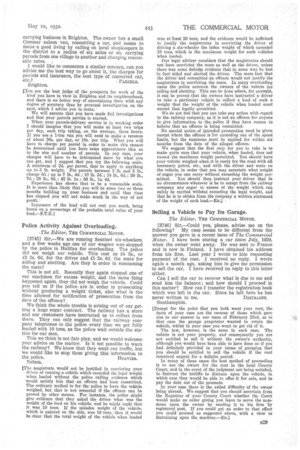Police Activity Against Overloading.
Page 43

If you've noticed an error in this article please click here to report it so we can fix it.
The Editor, THE COMMERCIAL Moron.
[3745] Sir,—We are running Sentinel six-wheelers, and a few weeks ago one of our wagons was stopped by the police in Halifax for overloading. The police did not weigh our vehicle. This cost us £4 5s., or E3 2s. 6d. for the driver and 2s. 6d. the mate for aiding and abetting. Are they in order in summoning the mate?
This is not all. Recently they again stopped one of our machines for excess weight, and the same thing happened again, they did not weigh the vehicle. Could you tell us if the police are in order in prosecuting without producing a weight ticket, also what is the time allowed for notification of prosecution from the date of the offence?
We think the whole trouble is arising out of our getting a huge sugar contract. The railway has a store and our customers have instructed us to collect from there. They can only suggest that the railway company telephones to the police every time we get fully loaded with 10 tons, as the police wait outside the station for our men.
This we think is not fair play, and we would welcome your advice on the matter. Is it not possible to warn the railway? We know that they want our traffic, but we would like to stop them giving this information to
the police. HEAVIES. Nelson.
[The magistrate would not be justified in convicting your driver of running a vehicle which exceeded the legal weight when loaded without the police calling evidence which would satisfy him that an offence bad been committed. The ordinary method is for the police to have the vehicle weighed, but that is not essential if the offence can be proved by other means. For instance, the police might give evidence that they asked the driver what was the weight of the lord on his vehicle, and he might reply that it was 10 tons. If the unladen weight of the vehicle, which is painted on the side, was 10 tans, then it would be clear that the total weight of the vehicle when loaded
was at least 20 tons, and the evidence would be sufficient to justify the magistrates in convicting the driver of driving a six-wheeler the laden weight of which exceeded 19 tons, which is the maximum weight for such vehicles when loaded. •
Our legal adviser considers that the magistrates should not have convicted the mate as well as the driver, unless there was some definite evidence that in some way he had in fact aided and abetted the driver. The mere fact that the driver had committed an offence would not justify the magistrates in convicting the mate. In many overloading cases the police summon the owners of the vehicle for aiding and abetting. This can be done where, for example, it can be proved that the owners have instructed a driver to take a particular vehicle to collect a load of such a weight that the weight of the vehicle when loaded must exceed that legally permitted.
We do not feel that you can take any action with regard to the railway company, as it is not an offence for anyone to give information to the police if they have reason to believe that an offence is being committed.
No special notice of intended prosecution need be given except where the offence is for exceeding one of the speed limits, but the summons must be applied for within six months from the data of the alleged offence.
We suggest that the first step for you to take is to make quite sure that your vehicle, when loaded, does not exceed the maximum weight permitted. You should have your vehicle weighed when it is ready for the road with all necessary petrol, etc., and with the driver and mate on the vehicle, in order that you may ascertain what weight
of sugar you can carry without exceeding the weight-permitted. You should then instruct your driver that in no circumstance whatever is he to accept from the railway company any sugar in excess of the weight which can safely be carried withe'ut exceeding the legal weight, and that he is to obtain from the company a written statement of the weight of each load.—En.] •




























































































